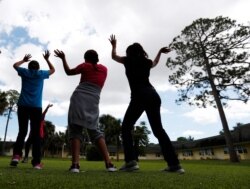There's no vaccine or specialized treatment to ward off the coronavirus, but there are things you can do to keep yourself safe.
How can I increase my chances of staying healthy and avoiding getting COVID-19, the new coronavirus?
Dr. Anthony Fauci, an expert on infectious diseases, told a Senate hearing, by washing your hands, staying away from people who are coughing or sneezing and keeping your children home from school if they are sick, you can up your chances of avoiding the coronavirus as well as other viruses like the flu.
Is there a 'right' way to wash my hands?
Yes. The U.S. Centers for Disease Control and Prevention says to wet your hands, lather with soap, scrub for 20 seconds and rinse under clean, running water. Of course, dry your hands with a clean towel. Viruses can live on clothing and other surfaces. The Mayo Clinic says "frequent hand-washing is one of the best ways to avoid getting sick and spreading illness."
Mayo Clinic also advises that if you use a hand sanitizer, make sure it has at least 60% alcohol. Then you apply the gel to the palm of one hand, then rub the gel all over your hands and fingers until they are dry.
When should I wash my hands?
The World Health Organization recommends hand washing after using the toilet, before meals, before, during and after you prepare food, after you handle animals, whenever your hands are visibly dirty and when you are caring for someone who is sick.
What about coughing?
Cough or sneeze into the crook of your elbow, especially if you don't have a tissue.
What if someone coughs on me?
Dr. Ann Schuchat of the CDC said if you are near someone who coughs, droplets of the coronavirus can spread through the air. The World Health Organization recommends staying at least three meters away from other people so you don't breathe in the droplets, although coughing can spread droplets as far as six meters and sneezing up to eight meters. Once they are airborne, viruses can survive for hours in the droplets or on the surfaces where they land.
If you see someone starting to cough, turn your head or entire body away from that person. You can help protect yourself by covering your mouth and nose with some cloth or tissue to help prevent you from breathing in other people’s germs. Also avoid touching your eyes, nose and mouth so the virus can't enter your body.
Are there other precautions I can take?
Yes. Don't travel to affected areas and stay informed.
Avoid drinking from the same glass or sharing forks or other utensils with others. COVID-19 is still a mystery, but some people may be able to pass the virus on before they show signs of illness.
If you live in an area where seasonal influenza is circulating, get a flu shot, and make sure your other vaccinations are up to date. Any illness can weaken your immune system and make it easier for you to get the coronavirus.
Clean cell phones, light switches, door handles and things you touch frequently with a disinfectant such as a detergent mixed with water or bleach. Follow directions on the container.
The Harvard Medical School says you can also boost your immune system by exercising regularly, eating fruits and vegetables, maintaining a healthy weight, drinking alcohol only in moderation, getting enough sleep, minimizing stress and by not smoking tobacco products.
What if the virus is circulating in my community?
CDC says make a plan for your household in advance, if possible. Choose a room that can be used to separate sick household members from those who are healthy. If someone gets sick, keep your distance from that person as much as possible.
Stockpile non-perishable food, toiletries, and medications, particularly those that can reduce fevers. Do this in advance, if possible.
Stay away from crowds, especially in enclosed spaces, and avoid contact with people who are sick.
What if I or a family member gets sick?
If you or a family member starts coughing, has a fever or shortness of breath, call a doctor for advice, otherwise, stay home and avoid contact with other people. Most people recover at home. Wear a protective face mask to reduce the chances of infecting others.






